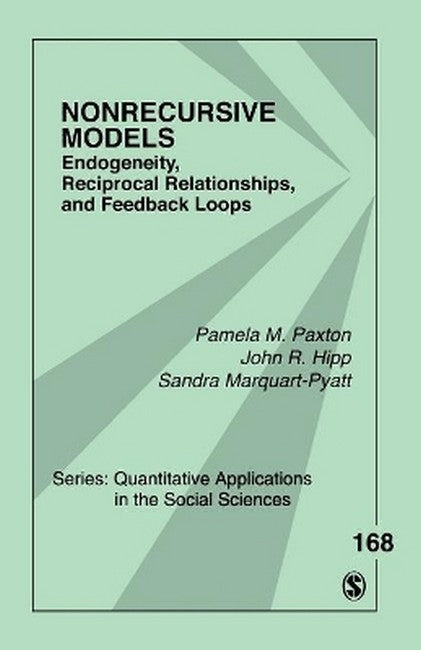Pamela Paxton is professor of sociology and public affairs and the Christine and Stanley E. Adams, Jr. Centennial Professor in the Liberal Arts at The University of Texas at Austin. She received her undergraduate degree from the University of Michigan in economics and sociology and her PhD in sociology from the University of North Carolina at Chapel Hill. She has consulted for the U.S. Agency for International Development (USAID) and the National Academies. She is the author of numerous scholarly articles on women in politics, which focus on statistical models of women's parliamentary representation. Her research has appeared in a variety of journals, including American Sociological Review, American Journal of Sociology, Social Forces, Comparative Politics, International Studies Quarterly, and Legislative Studies Quarterly. She is also an author of Nonrecursive Models: Endogeneity, Reciprocal Relationships, and Feedback Loops (2011). John R. Hipp is Assistant Professor in the departments of Criminology, Law and Society, and Sociology, at the University of California Irvine. His substantive research interests focus on how neighborhoods change over time, how that change both affects and is affected by neighborhood crime, and the role networks and institutions play in that change. He approaches these questions using quantitative methods. He has published methodological work in such journals as Sociological Methodology, Psychological Methods, and Structural Equation Modeling, a book chapter in the New Handbook on Data Analysis edited by M.A. Hardy, and contributed to an entry in the Encyclopedia of Social Science Research Methods edited by M. Lewis-Beck, A. Bryan, and T.F. Liao. He has published substantive work in such journals as American Sociological Review, Criminology, Social Forces, Social Problems, Mobilization, City & Community, Urban Studies and Journal of Urban Affairs. He currently teaches a graduate course on Structural Equation Models, and taught a course on Simultaneous Equation Models for the ICPSR Summer Program in Quantitative Methods for three years - 2003 to 2005. Sandy joined the Sociology department at Utah State University in fall of 2004. She received her Ph.D. in Sociology from The Ohio State University in Columbus, OH in 2004 with specializations in Environmental Sociology, Political Sociology, Comparative Social Change, and Social Psychological Aspects of Democratization. Her research and teaching interests include environmental sociology, research methods and statistics (especially hierarchical linear modeling and structural equation modeling), social change and development, social movements, political sociology (emphasizing democracy and democratization), and social psychology.
Request Academic Copy
Please copy the ISBN for submitting review copy form
Description
About the Authors Series Editor's Introduction Acknowledgments 1. Introduction 2. Specifications of Simultaneous Equation Models 3. Identification 4. Estimation 5. Assessment 6. Model Interpretation 7. Conclusion References Author Index Subject Index

